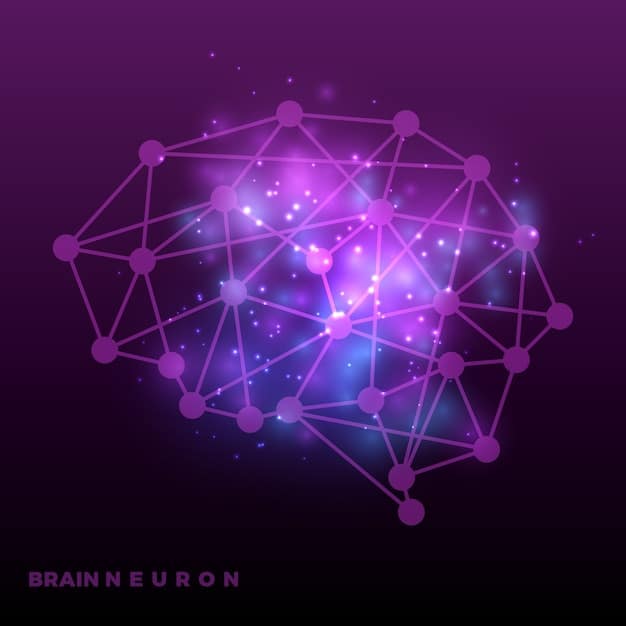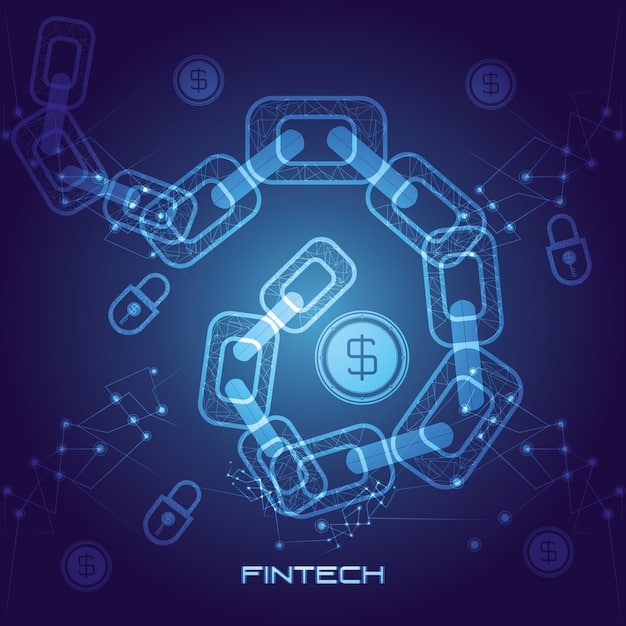Blockchain and AI Synergies: Use Cases in the US

Blockchain and Artificial Intelligence (AI) are emerging technologies with the potential to revolutionize various industries in the US, offering enhanced security, transparency, and efficiency through their synergistic applications and innovative use cases.
The convergence of blockchain and artificial intelligence (AI): Exploring Synergies and Use Cases in the US is sparking innovation across various sectors. This article delves into how these technologies are being integrated to create novel applications, enhance existing systems, and drive efficiency gains in the American market.
Understanding the Basics: Blockchain and AI
Before diving into their synergies, it’s essential to grasp the fundamentals of each technology. Blockchain provides a secure, transparent, and decentralized ledger, while AI enables machines to learn, reason, and make decisions.
What is Blockchain?
Blockchain technology is a distributed and immutable ledger that records transactions across many computers. It ensures data integrity and transparency, making it ideal for secure data management.
What is Artificial Intelligence?
Artificial Intelligence (AI) involves the development of computer systems capable of performing tasks that typically require human intelligence, such as learning, problem-solving, and decision-making.
- Machine Learning: A subset of AI that allows systems to learn from data without explicit programming.
- Deep Learning: An advanced form of machine learning that uses neural networks to analyze complex patterns.
- Natural Language Processing (NLP): Enables machines to understand and process human language.
Together, understanding these fundamentals sets the stage for exploring how these technologies can complement each other.
Synergistic Potential: How Blockchain and AI Work Together
When combined, blockchain and AI can amplify each other’s capabilities, leading to more robust and efficient systems. AI can enhance blockchain’s functionality, while blockchain can provide AI with more trusted and secure data.

Enhanced Data Analysis
AI algorithms can analyze vast amounts of blockchain data to identify trends, predict outcomes, and improve decision-making processes. This capability is particularly valuable in finance and supply chain management.
Improved Security
Blockchain’s inherent security features, combined with AI-driven threat detection, can create highly secure systems. AI can identify anomalies and potential vulnerabilities, while blockchain ensures the integrity of security data.
- Anomaly Detection: AI algorithms can detect unusual patterns in blockchain transactions, flagging potential fraud.
- Identity Verification: AI-powered facial recognition can enhance identity verification processes on blockchain networks.
- Smart Contract Auditing: AI can automatically audit smart contracts to identify vulnerabilities and bugs.
This synergistic potential unlocks new possibilities for innovation and efficiency across various sectors.
Use Cases in Finance
The financial sector is one of the earliest and most promising adopters of combined blockchain and AI solutions. These technologies can streamline operations, enhance security, and improve customer experiences.
Fraud Detection and Prevention
AI algorithms can analyze transaction data on blockchain to identify fraudulent activities. This enhances fraud detection systems, reducing losses for financial institutions and customers.
Algorithmic Trading
Blockchain can provide a secure and transparent platform for algorithmic trading systems powered by AI. This ensures fair trading practices and reduces the risk of market manipulation.

Financial institutions are increasingly exploring these use cases to stay competitive and meet evolving regulatory requirements.
Blockchain and AI in Healthcare
Healthcare is another sector poised to benefit significantly from the integration of blockchain and AI. These technologies can improve data management, enhance security, and accelerate research.
Secure Data Management
Blockchain can provide a secure and interoperable platform for storing and sharing patient data. AI can analyze this data to identify patterns and improve treatment outcomes, all while keeping private patient information secure.
Drug Discovery and Development
AI algorithms can analyze large datasets of clinical trials and research papers stored on blockchain to accelerate the drug discovery and development process.
- Personalized Medicine: AI can analyze patient data on blockchain to develop personalized treatment plans.
- Supply Chain Management: Blockchain can track the supply chain of pharmaceuticals, ensuring authenticity and preventing counterfeiting.
- Clinical Trial Management: AI can help manage and analyze clinical trial data on blockchain, improving efficiency and transparency.
By transforming data management and operational efficiency, the synergy can create more efficient, reliable, and patient-centered healthcare systems.
Supply Chain Management
Integrating blockchain and AI in supply chain management can enhance transparency, traceability, and efficiency. These technologies can track products from origin to consumer, ensuring authenticity and quality.
Improved Traceability
Blockchain provides an immutable record of each product’s journey through the supply chain. AI can analyze this data to identify bottlenecks, optimize logistics, and prevent fraud.
Counterfeit Prevention
By tracking products on blockchain and using AI to verify their authenticity, companies can reduce the risk of counterfeit goods entering the market.
These applications not only safeguard product integrity but also help build consumer trust and brand reputation.
Challenges and Considerations
Despite the immense potential, there are several challenges that need to be addressed to fully realize the benefits of combining blockchain and AI. These include regulatory uncertainty, data privacy concerns, and the need for skilled professionals.
Regulatory Uncertainty
The regulatory landscape for blockchain and AI is still evolving, particularly in the US. Clear and consistent regulations are needed to provide a stable environment for innovation.
Data Privacy
Ensuring data privacy is crucial when combining blockchain and AI, especially when dealing with sensitive information. Robust privacy protocols and governance frameworks are necessary to protect user data.
- GDPR Compliance: Adhering to GDPR guidelines is essential for protecting personal data.
- Data Minimization: Collecting only the necessary data can reduce privacy risks.
- Anonymization Techniques: Using anonymization techniques can protect the identity of individuals while still allowing data analysis.
Overcoming these challenges is critical for widespread adoption and responsible innovation.
The Future of Blockchain and AI in the US
The future of blockchain and AI in the US looks promising, with ongoing research and development paving the way for new applications and innovations. As these technologies mature, they are expected to play an increasingly important role in various industries.
Continued Innovation
Continued investment in research and development is essential for driving innovation and exploring new synergies between blockchain and AI.
Industry Collaboration
Collaboration between industry stakeholders, academia, and government agencies can accelerate the adoption of these technologies and address common challenges.
Looking ahead, the integration of blockchain and artificial intelligence (AI): Exploring Synergies and Use Cases in the US is set to transform industries and enhance societal well-being.
| Key Point | Brief Description |
|---|---|
| 🛡️ Security Enhancement | AI enhances blockchain security by detecting anomalies and preventing fraud. |
| 📊 Data Analysis | AI analyzes blockchain data to identify trends and improve decision-making. |
| 🏥 Healthcare Applications | Improved data management, drug discovery, and personalized medicine. |
| 🏭 Supply Chain Efficiency | Enhanced traceability and counterfeit prevention in supply chains. |
Frequently Asked Questions
▼
Combining blockchain and AI enhances security, improves data analysis, and increases efficiency across various industries. Specifically, it fosters transparency, builds trust, and provides greater optimization and automation.
▼
Blockchain offers a secure and immutable ledger, while AI algorithms can detect anomalies and potential vulnerabilities. Together, they create a robust security system by ensuring data integrity and identifying security threats.
▼
AI algorithms can analyze large volumes of blockchain data to identify trends, predict outcomes, and improve decision-making processes in areas such as finance, supply chain management, and healthcare.
▼
Yes, the regulatory landscape for blockchain and AI is still evolving, particularly in the US. Clear and consistent regulations are needed to provide a stable environment for innovation and to ensure compliance with data privacy.
▼
Finance, healthcare, and supply chain management are among the industries most likely to benefit from the integration of blockchain and AI. These sectors can leverage synergistic applications to enhance security, efficiency, and innovation.
Conclusion
The integration of blockchain and AI represents a transformative opportunity for various industries in the US. By addressing the challenges and fostering continued innovation, these technologies can unlock new levels of efficiency, security, and trust, paving the way for a more connected and intelligent future.





